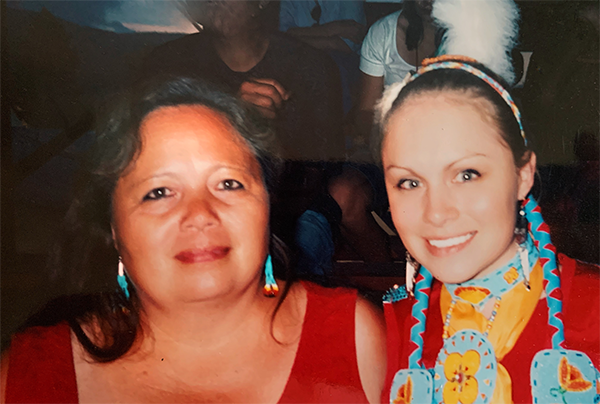Student Spotlight: Melinda Smith

When Melinda Smith was in grade school, she found a supportive mentor in her great-aunt Willie—a retired high school teacher of 25+ years in the Arlee Public School system in Montana—whose example of strength and wisdom changed the trajectory of the young girl’s life.
Smith, a member of the Confederated Salish and Kootenai Tribes, said her small town of fewer than 1,000 people is on the south end of the Flathead Reservation in northwest Montana.
“It is nestled in the beautiful Jocko Valley, surrounded by mountains, rivers, and crystal-clear mountain lakes,” Smith said. “If you are from there, you spend a lot of time in the mountains as a kid. I think I know the mountains there like the back of my hand.”
Since starting her Doctorate in Interdisciplinary Health at Northern Arizona University three and a half years ago, Smith was named the Louis and Betty Quayle Scholarship Recipient and was named a Tribal Research Cancer Control Fellow.
“Melinda is a thoughtful, committed and innovative scholar, all the necessary characteristics to advance Indigenous health,” said Nicolette Teufel-Shone, associate director of the Center for Health Equity Research and Smith’s doctoral advisor. “Her dissertation research design is quite robust, allowing her to gain quantitative skills and to expand her proficiency in community collaboration. She is building a strong foundation to become a leader in Indigenous health.”
During the COVID-19 pandemic, she participated in motivational interviewing training through CHER and the Hualapai Tribal Health Department, and she assisted as a COVID-19 contact tracer for Coconino County.
Smith earned her Bachelor of Science in Exercise Science from the University of Montana and her Master of Science in Exercise Nutrition Sciences from Montana State University.
“During my master’s program, I was invited to be a part of various lab-based and community-based research projects, which, in general, were focused on chronic disease prevention and management in various Indigenous communities in Montana, including my own community,” Smith said. “Most of these projects had multidisciplinary teams. That experience influenced my decision to pursue my doctorate in interdisciplinary health.”

Through her graduate assistantship with the Southwest Health Equity Research Collaborative, Smith is working on a program that is focused on how the COVID-19 pandemic impacted mental well-being and resilience among three southwest Indigenous communities. She is also working on her dissertation project, which is focused on the intersection of type 2 diabetes and certain cancers among Indigenous populations.
“My dissertation project has an epidemiological component, which will involve assessing the relationship between diabetes and certain cancers, and a community-engaged component, which will involve a collaborative effort to develop and implement a health education program to reduce cancer risk among those living with diabetes in a southwest Indigenous community,” she said.
Smith is scheduled to graduate in May of 2024.
“When I graduate, I plan to use my education and skills to continue collaborating with Indigenous communities to address health inequities and improve health disparities,” Smith said.